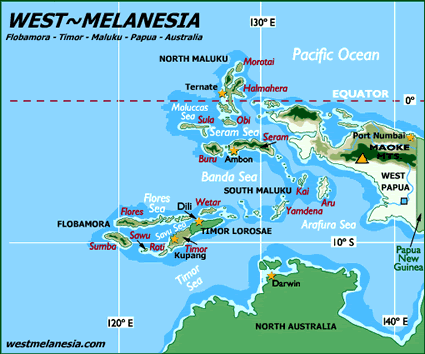The Sepa Tamilouw people are an indigenous ethnic group residing in the Maluku Province of Indonesia, specifically in Sepa village on Seram Island. They are part of the Maluku-Central people cluster within the Malay Peoples affinity bloc. Their primary language is Sepa, and they are known by the alternate name "Tamilouw."
Historically, they have lived in enclaves along the southwest coast between Elapaputih and Teluti bays. Their cultural identity is deeply rooted in the traditions of the Maluku region, and they have maintained a distinct presence despite broader Indonesian national cultural influences.
The Sepa Tamilouw people live in small, coastal communities where daily life revolves around subsistence activities such as fishing, farming, and forest gathering. Agriculture is often practiced using traditional methods, and local wisdom plays a significant role in conserving natural resources. Practices like dusung (forest gardens), sasi (seasonal harvesting restrictions), and reverence for pamali (taboo) and sacred places reflect their deep connection to the land.
Family life is central to their culture. Like many Indonesians, Tamilouw families are collectivist, with strong intergenerational ties. The father or eldest male typically holds authority, while women manage domestic responsibilities. Children are expected to honor and obey their parents, and extended family members often live together or nearby. Celebrations often align with Islamic holidays, such as Eid al-Fitr and Eid al-Adha, and may include communal meals and prayers.
Food is locally sourced and reflects the coastal environment—fish, sago, coconut, and tropical fruits are staples. Meals are often shared communally, reinforcing social bonds.
The majority of the Sepa Tamilouw people practice Sunni Islam, which is the dominant religion in their region. Islamic traditions shape daily life, including prayer, fasting during Ramadan, and participation in religious festivals. A minority identify as Christians, and a small percentage are evangelical believers. Despite the presence of Christianity, the community has little historical exposure to the gospel, and Christian resources such as Scripture translations, audio recordings, or films are not widely available.
Spirituality in the region also includes elements of traditional beliefs. In rural areas, spiritual healers known as dukun may still play a role in health and community rituals, blending Islamic faith with indigenous practices.
Access to healthcare and education remains limited in many parts of Seram Island. Physical infrastructure, such as roads, clinics, and schools, may be underdeveloped, making it difficult for families to receive consistent services. Economic opportunities are also constrained, with most people relying on subsistence livelihoods.
Spiritually, the Sepa Tamilouw people have limited exposure to the Christian gospel. There is a need for culturally sensitive outreach and discipleship, especially given the lack of translated Scripture and Christian media in the Sepa language. The community would benefit from holistic ministry efforts that address both physical and spiritual well-being.
Pray for the light of the gospel to reach the Sepa Tamilouw people.
Ask for open hearts and divine appointments for those sharing the message of Christ.
Pray for many to become Christ's ambassadors to Indonesian Muslims.
Intercede for improved access to healthcare, education, and clean water.
Pray for unity and peace within families and villages, and for protection from natural disasters and conflict.
Scripture Prayers for the Tamilouw, Sepa in Indonesia.
Academia.edu. Kearifan Lokal Sebagai Bentuk Konservasi Tradisional Sumberdaya Alam di Desa Tamilouw
Cultural Atlas. Indonesian Family Culture
Hektoen International. Spirituality and Traditional Medicine in Indonesia
| Profile Source: Joshua Project |











